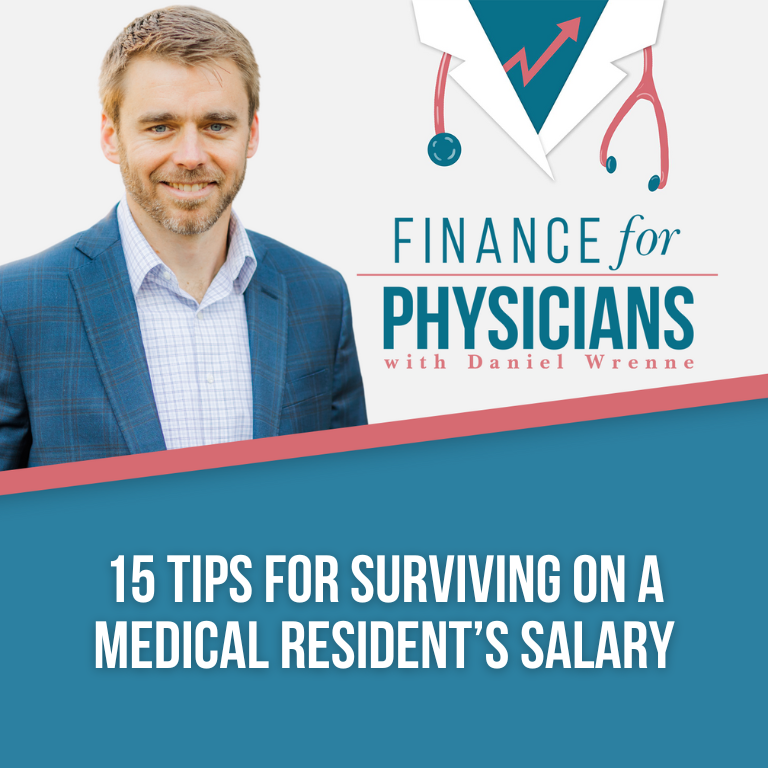Are you serious about living within your means and maximizing your resident salary? Here are 15 tips to get you moving in the right direction!
1) Determine what you’re working with
In our area, the first year resident salary is around $50K/yr. Make sure to subtract federal, state & local taxes and other payroll deductions when calculating your take home pay. Use an online calculator like this to help… Don’t forget to subtract your payroll deductions like health insurance and other benefits. Most residents making $50K/yr will take home around $3K/mo. This is your starting point!
2) Plan out your spending
You have a $3K budget! Where will it all go? Leave no $’s unaccounted for! If you want to save while in residency, carve these $’s out first otherwise they will not be left over. Then work through fixed expenses such as housing, autos, and debt payments. And then variable expenses like personal care, necessities, and entertainment. Don’t forget to budget for unexpected expenses, major purchases (next 1-3 yrs), and insurance (long term disability and term life).
3) Keep your priorities straight
Do not make any major financial decisions, like buying a home or car, until you have performed the above exercise. This is commonly overlooked and the main reason residents get into financial trouble.
4) Get organized
Continue to track your expenses over time to make sure you’re staying within budget. Take inventory of your net worth at least annually (assets minus liabilities equals net worth). Document all your insurance and investment holdings. We keep track of these for clients and are happy to share our templates upon request.
5) Seek guidance from others
Run your numbers by someone you trust who will provide an honest, informed and objective opinion. We serve this role for our clients.
6) Rent your home!
Renting is far less expensive over short periods of time when you take everything into consideration! Also, mortgage interest typically provides no tax benefits while in residency. The best part with renting is when you’re done with training, simply turn in the keys and move on.
7) Drive old, reliable cars
When you start residency, the hospital should automatically issue you a 10 yr old Honda Accord to be used during your time in training. Even these cars have been known to die and if this occurs don’t buy a nice replacement car. Go straight back to the Honda classifieds and look for 10+ yr old cars with low mileage.
8) Cut cable TV
When you are pinching pennies, cable should get the axe. You won’t have any time to watch tv anyway. Everybody talks about cutting cable and often can’t follow through – take the lead on this one.
9) Live like a student
Most people get into trouble trying to keep up with the Jones’. Don’t try and live like an attending or even a typical resident. Live like a student!
10) Establish income based payments on student loans
Income based payments are nice in residency because you have little income. Also, if you’re going for PSLF, you want to get those qualified payments going asap. Don’t get overly ambitious and try to pay off your student loans before you do anything else. Build up some cash reserves first before you get aggressive with your loans.
11) Use cash
If you’re having trouble budgeting, stop using credit cards! Even if you’re grandfathered into the best credit card rewards system known to man – when working to live frugally, cash works best. Cash runs out quickly, and when it does, stop spending! If you can’t imagine going all in with cash, start small. Go to all cash in your weakness area (like dining out or shopping).
12) Meal plans work great
Plan meals out ahead of time and use it to build your grocery list. While at the grocery, limit purchases to those on your list. This saves a ton of money and limits waste. Also, you are less likely to go out to eat when meals are planned out.
13) Your spouse must be on board
For those married residents, your spouse must be 100% on board with the plan! If not, work through your differences.
14) Be cautious moonlighting
Is your resident salary not going to cut it? Moonlighting income can cause more harm than good if managed incorrectly. Do not moonlight if you don’t already have great control over your money. Often the additional income does not correct the underlying problem (lack of control) and you revert to spending what you make. If you are going to moonlight, do something productive with 100% of the income (like give, save or pay off debt) otherwise it’s a bad idea. It’s not like you have tons of free time to work more, so when you get a rare break, go do something fun or hangout with your family!
15) Control your money (don’t let money control you)
Don’t forget to have fun! Ultimately it’s about balance. The greatest benefit to managing your finances well is you learn to control your money. This will serve you well in life!
